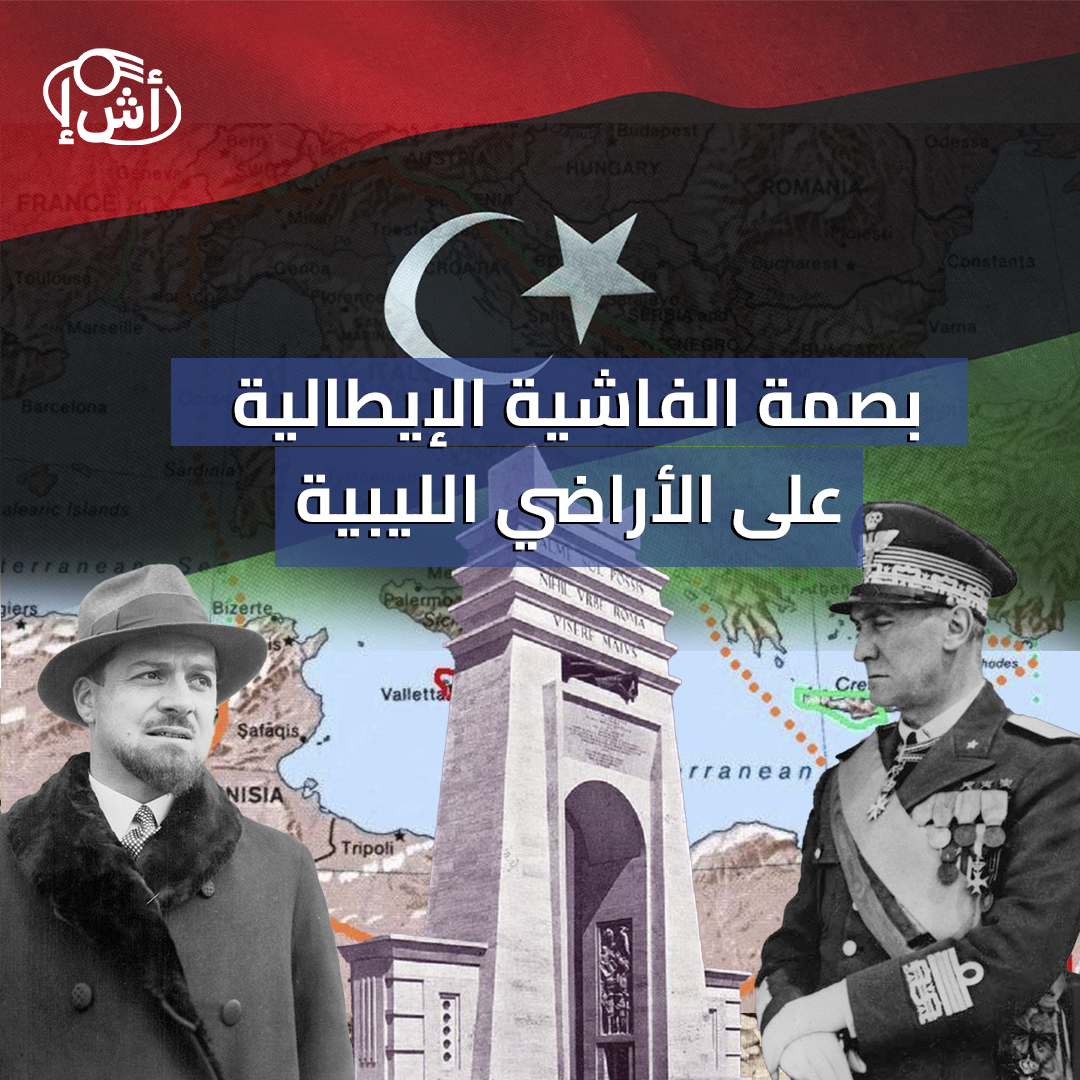Since the term “fourth shore” appeared in Italian colonial thinking, Libya has become a different vital area for Italian leaders.
Libya was formed at the beginning of the twentieth century in the perceptions of Italian leaders, and it is no longer just a wide beach in the heart of North Africa only, but also the scene of tragic events that are still present in the memory of Libyans, and a special stage that also carries with it a historical record as the contemporary culture that led Libya to move from an Italian colony to an independent state.

During the period of Italian colonial rule, especially during the fascist regime from 1934 to 1939, it was characterized by a complex interplay between repression and modernization, cultural erasure, and resistance under figures such as Italo Balbo and Rodolfo Graziani, which had multifaceted effects as a result of Italian fascist policies on Libyan society, culture, and identity.
Iron Fist and Fascist Politics
Under Royal Legislative Decree No. 2012 issued on December 3, 1934, the Italian colony in North Africa bore the name of Libya, and one colony became its headquarters in Tripoli, where the administrative unification of the regions of Tripolitania and Cyrenaica, after they were previously two single Italian regions, and with the appointment of Italo Balbo as governor of Tripolitania and Cyrenaica in January 1934, new variables appeared in the administration of the colony, such as issues of cooperation and integration between Libyan citizens and Italian settlers, and between Libyan citizens and the “motherland Italy”.

After two years of repression by which the Libyan resistance was crushed in Cyrenaica by Graziani in 1932, Balbo sought cultural repression through reconciliation tactics with Libyans.
Balbo benefited from the experience of previous Italian rulers, most notably Graziani, as the Libyan resistance at those stages was based on the nature of Libyan society based on “tribal relations” on the one hand, and on the Sufi heritage, which also provided a wide network for the mobilization of Libyans.
All Balbo policies that were put into a “mold” of development and integration concepts were in fact a process of “cultural replacement” to Italianize Libya, and a key to this strategy was the unification of the Libyan provinces under a central Italian administration, with the aim of integrating the colony into the broader fabric of the Italian state.
This was not just an administrative reorganization, but a deliberate attempt to erase Libyan identity and replace it with an imposed Italian culture.
Balbo’s actions appeared to be merely a political framework that had nothing to do with Libyan culture, and the resistance continued to interact under a reality imposed by issues of integration and changing cultural customs, as Libyan tribes rooted in their lands and traditions opposed the Italian offer.

Although this period is different from the brutal crackdown led by military figures like Graziani, the “cultural repression” has been more impactful in the long run, as Libya appeared to be a model trying to break colonial ambitions.
Balbo was not only a phenomenon because of his ardent fascist ideology, but also because of his vision of Libya as an integral part of the Italian Empire, his policies sought to transform Libya through development initiatives, including infrastructure projects and agricultural reforms, where he portrayed modern Libya as part of the Italian network of interests, and his initiatives were contradictory, encouraging modernization while imposing apartheid and exploiting Libyan resources and labor, and embodying a complex legacy that embodies the contradictions of Italian colonial policy, combining arguments of evolution with the domination and total abolition of culture. Libyan.
Cultural clash: resistance and adaptation among the Libyan people
The Italian effort to reshape Libyan society faced a flexible culture with deep historical roots, and Libyan tribes and societies used different strategies to resist and impose their existence, or even adapt to attempts to change the social structure in general, by negotiating within the neo-colonial system, or ignoring the imposed cultural changes.
The clash of cultures was not just a battle of wills, but a profound transformation in Libyan society, as Italian policies disrupted traditional social structures, introduced new forms of governance, forced a reassessment of Libyan identity in the colonial context, and tried to replace the strong references of Libyan society, whether tribal leaders or leaders of Sufi orders, with institutions that are in fact structures for managing the conflict with the Libyan people.
Effects of Italian rule
The shadow of Italian colonial rule remained in Libya, a legacy that appears in the infrastructure created to manage the contradiction between colonial rule and resistance, and the period of Italian rule left behind a complex legacy that continues to affect Libyan society in culture and politics, as the Italian period in Libyan history serves as a reminder of the complexities of colonial confrontations, and emphasizes the importance of understanding this era not only as a period of repression, but as a pivotal moment in the formation of modern Libyan identity.

The fascist regime created a suitable context or environment to change the legal and administrative status of Libya to pursue the process of annexing the four Libyan provinces of Tripoli, Misrata, Benghazi, and Derna to Italy, and in this way, it was possible to achieve the expansion of Italian hegemony over the central Mediterranean.
The Italian colonial project in Libya represented only a picture of subtle and hidden discrimination at the level of Libyan social classes, as the focus of this project is racial discrimination and deepening contradiction within social groups, and its ultimate goal is to create a new social elite capable of dealing with colonial institutions, and Italy’s policies were limited to building a current of “minority” of the people with influence and power, and rewarding this elite while imposing a disparity between them and the rest of Libyan society.
Written by Nidal Al Khedary
The legitimacy Paradoxes of the International Criminal Court
